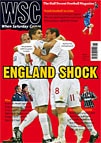 Ashley Timms found himself jailed for attempting to blackmail a Premier League footballer. But as Mike Whalley reports, his attempts to rebuild his career are not running smoothly
Ashley Timms found himself jailed for attempting to blackmail a Premier League footballer. But as Mike Whalley reports, his attempts to rebuild his career are not running smoothly
When you’re trying to rebuild your career after a spell in prison, the last thing you need is to fall out with your boss after barely a month. But Ashley Timms isn’t very good at steering clear of trouble. In September last year, the former Man City youth-team keeper was jailed after admitting that he tried to blackmail an unnamed Premier League footballer over a mobile phone sex video.